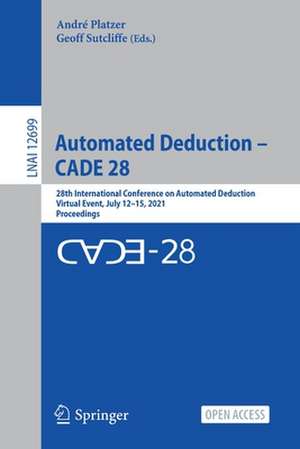Automated Deduction – CADE 28: 28th International Conference on Automated Deduction, Virtual Event, July 12–15, 2021, Proceedings: Lecture Notes in Computer Science, cartea 12699
Editat de André Platzer, Geoff Sutcliffeen Limba Engleză Paperback – 8 iul 2021
Din seria Lecture Notes in Computer Science
- 20%
 Preț: 1061.55 lei
Preț: 1061.55 lei - 20%
 Preț: 307.71 lei
Preț: 307.71 lei - 20%
 Preț: 438.69 lei
Preț: 438.69 lei - 20%
 Preț: 645.28 lei
Preț: 645.28 lei -
 Preț: 410.88 lei
Preț: 410.88 lei - 15%
 Preț: 580.46 lei
Preț: 580.46 lei - 17%
 Preț: 427.22 lei
Preț: 427.22 lei - 20%
 Preț: 596.46 lei
Preț: 596.46 lei -
 Preț: 381.21 lei
Preț: 381.21 lei - 20%
 Preț: 353.50 lei
Preț: 353.50 lei - 20%
 Preț: 1414.79 lei
Preț: 1414.79 lei - 20%
 Preț: 309.90 lei
Preț: 309.90 lei - 20%
 Preț: 583.40 lei
Preț: 583.40 lei - 20%
 Preț: 1075.26 lei
Preț: 1075.26 lei - 20%
 Preț: 310.26 lei
Preț: 310.26 lei - 20%
 Preț: 655.02 lei
Preț: 655.02 lei - 20%
 Preț: 580.93 lei
Preț: 580.93 lei - 20%
 Preț: 340.32 lei
Preț: 340.32 lei - 15%
 Preț: 438.59 lei
Preț: 438.59 lei - 20%
 Preț: 591.51 lei
Preț: 591.51 lei - 20%
 Preț: 649.49 lei
Preț: 649.49 lei - 20%
 Preț: 337.00 lei
Preț: 337.00 lei -
 Preț: 449.57 lei
Preț: 449.57 lei - 20%
 Preț: 607.39 lei
Preț: 607.39 lei - 20%
 Preț: 1024.44 lei
Preț: 1024.44 lei - 20%
 Preț: 579.30 lei
Preț: 579.30 lei - 20%
 Preț: 763.23 lei
Preț: 763.23 lei - 20%
 Preț: 453.32 lei
Preț: 453.32 lei - 20%
 Preț: 575.48 lei
Preț: 575.48 lei - 20%
 Preț: 585.88 lei
Preț: 585.88 lei - 20%
 Preț: 825.93 lei
Preț: 825.93 lei - 20%
 Preț: 763.23 lei
Preț: 763.23 lei - 17%
 Preț: 360.19 lei
Preț: 360.19 lei - 20%
 Preț: 1183.14 lei
Preț: 1183.14 lei - 20%
 Preț: 340.32 lei
Preț: 340.32 lei - 20%
 Preț: 504.57 lei
Preț: 504.57 lei - 20%
 Preț: 369.12 lei
Preț: 369.12 lei - 20%
 Preț: 583.40 lei
Preț: 583.40 lei - 20%
 Preț: 343.62 lei
Preț: 343.62 lei - 20%
 Preț: 350.21 lei
Preț: 350.21 lei - 20%
 Preț: 764.89 lei
Preț: 764.89 lei - 20%
 Preț: 583.40 lei
Preț: 583.40 lei -
 Preț: 389.48 lei
Preț: 389.48 lei - 20%
 Preț: 341.95 lei
Preț: 341.95 lei - 20%
 Preț: 238.01 lei
Preț: 238.01 lei - 20%
 Preț: 538.29 lei
Preț: 538.29 lei
Preț: 322.08 lei
Preț vechi: 402.59 lei
-20% Nou
Puncte Express: 483
Preț estimativ în valută:
61.63€ • 63.58$ • 51.43£
61.63€ • 63.58$ • 51.43£
Carte tipărită la comandă
Livrare economică 26 martie-09 aprilie
Preluare comenzi: 021 569.72.76
Specificații
ISBN-13: 9783030798758
ISBN-10: 3030798755
Pagini: 650
Ilustrații: XIV, 650 p. 194 illus., 2 illus. in color.
Dimensiuni: 155 x 235 mm
Greutate: 0.92 kg
Ediția:1st ed. 2021
Editura: Springer International Publishing
Colecția Springer
Seriile Lecture Notes in Computer Science, Lecture Notes in Artificial Intelligence
Locul publicării:Cham, Switzerland
ISBN-10: 3030798755
Pagini: 650
Ilustrații: XIV, 650 p. 194 illus., 2 illus. in color.
Dimensiuni: 155 x 235 mm
Greutate: 0.92 kg
Ediția:1st ed. 2021
Editura: Springer International Publishing
Colecția Springer
Seriile Lecture Notes in Computer Science, Lecture Notes in Artificial Intelligence
Locul publicării:Cham, Switzerland
Cuprins
Invited Talks.- Non-well-founded Deduction for Induction and Coinduction.- Towards the Automatic Mathematician.- Logical Foundations.- Tableau-based decision procedure for non-Fregean logic of sentential identity.- Learning from Lukasiewicz and Meredith: Investigations into Proof Structures.- Efficient Local Reductions to Basic Modal Logic.- Isabelle's Metalogic: Formalization and Proof Checker.- Theory and Principles.- The ksmt calculus is a delta-complete decision procedure for non-linear constraints.- Universal Invariant Checking of Parametric Systems with Quantifier-Free SMT Reasoning.- Politeness and Stable Infiniteness: Stronger Together.- Equational Theorem Proving Modulo.- Unifying Decidable Entailments in Separation Logic with Inductive Definitions.- Subformula Linking for Intuitionistic Logic with Application to Type Theory.- Efficient SAT-based Proof Search in Intuitionistic Propositional Logic.- Proof Search and Certificates for Evidential Transactions.- Non-Clausal Redundancy Properties.- Multi-Dimensional Interpretation Methods for Termination of Term Rewriting.- Finding Good Proofs for Description Logic Entailments Using Recursive Quality Measures.- Computing Optimal Repairs of Quantified ABoxes w.r.t. Static EL Tboxes.- Generalized Completeness for SOS Resolution and its Application to a New Notion of Relevance.- A Unifying Splitting Framework.- Integer Induction in Saturation.- Superposition with First-Class Booleans and Inprocessing Clausification.- Superposition for Full Higher-Order Logic.- Implementation and Application.- Making Higher-Order Superposition Work.- Dual Proof Generation for Quantified Boolean Formulas with a BDD-Based Solver.- Reliable Reconstruction of Fine-Grained Proofs in a Proof Assistant.- An Automated Approach to the Collatz Conjecture.- Verified Interactive Computation of Definite Integrals.- ATP and AI.- Confidences for Commonsense Reasoning.- Neural Precedence Recommender.- Improving ENIGMA-Style Clause Selection While Learning From History.- System Descriptions.- A Normative Supervisor for Reinforcement Learning Agents (System Description).- Automatically Building Diagrams for Olympiad Geometry Problems (System Description).- The Fusemate Logic Programming System (System Description).- Twee: An Equational Theorem Prover (System Description).- The Isabelle/Naproche Natural Language Proof Assistant (System Description).- The Lean 4 Theorem Prover and Programming Language (System Description).- Harpoon: Mechanizing Metatheory Interactively (System Description).
Caracteristici
This book is open access, which means that you have free and unlimited access
